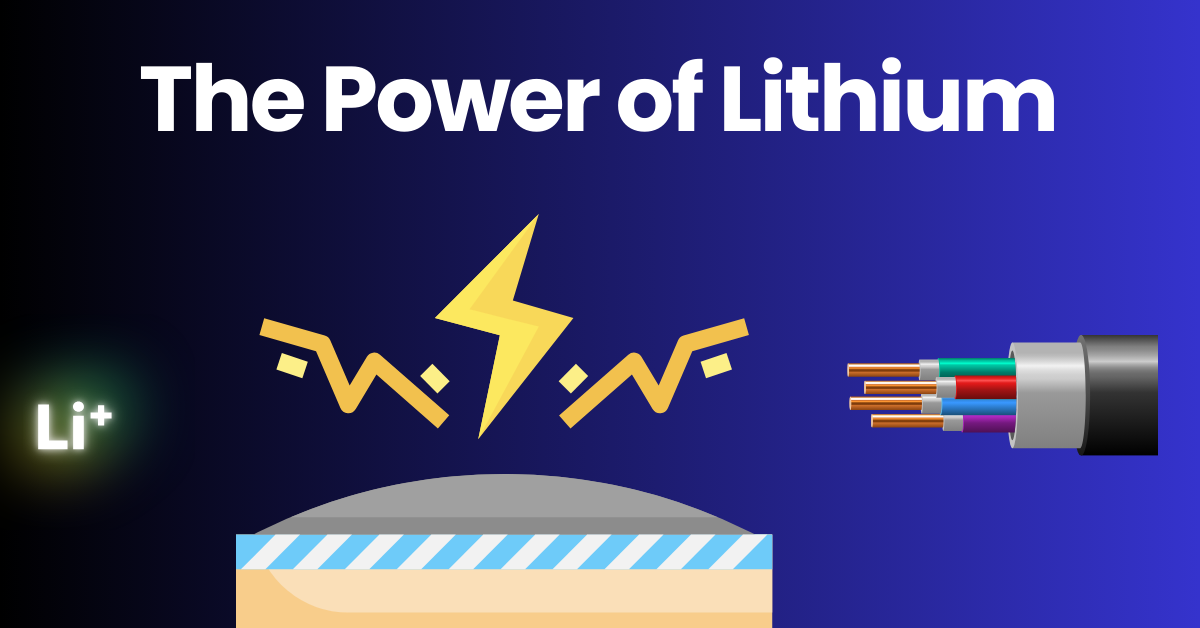The Revolutionary Impact of Lithium | Powering the Future

In the modern world, lithium has emerged as a cornerstone of innovation and progress. From powering everyday electronics to revolutionizing energy storage, lithium is at the heart of technological advancements. This post delves deep into the significance of lithium, exploring its various applications, benefits, challenges, and prospects. Whether you're a tech enthusiast, an environmental advocate, or just curious about the science behind this vital element, this comprehensive guide will provide valuable insights into the world of lithium.
The Basics of Lithium
Lithium, with the chemical symbol Li and atomic number 3, is a soft, silvery-white alkali metal. It is the lightest metal and the least dense solid element. Discovered in 1817 by Swedish chemist Johan August Arfvedson, lithium has since gained prominence due to its unique properties and diverse applications.
Lithium's Role in Technology
One of the most significant contributions of lithium is in the realm of technology. Lithium-ion batteries, which have become the standard for portable electronics, are a prime example. These batteries are prized for their high energy density, lightweight nature, and long cycle life. Here's a closer look at how lithium is transforming technology:
Lithium-Ion Batteries
Lithium-ion batteries are used in everything from smartphones and laptops to electric vehicles (EVs) and renewable energy storage systems. Their high energy density allows for longer battery life and more efficient power use compared to traditional batteries, making them indispensable in modern technology.
-
Consumer Electronics: Lithium batteries power most portable electronic devices, including smartphones, tablets, and laptops. Their lightweight and compact nature is ideal for these applications.
-
Electric Vehicles: The shift towards electric vehicles is heavily reliant on lithium-ion technology. These batteries offer the necessary power and range for EVs to be practical alternatives to internal combustion engine vehicles.
-
Renewable Energy Storage: Lithium-ion batteries are also crucial for storing energy from renewable sources like solar and wind. They help balance supply and demand, ensuring a reliable power supply even when the sun isn't shining or the wind isn't blowing.
Lithium in Energy Storage
Energy storage is a critical component of modern energy systems, and lithium plays a pivotal role in this sector. Lithium-ion batteries are ideal for storing energy because of their efficiency, longevity, and performance.
Grid Energy Storage
Lithium-ion batteries are increasingly used for grid energy storage solutions. They help stabilize the grid by storing excess energy during periods of low demand and releasing it during peak times. This helps in integrating renewable energy sources into the grid, promoting a more sustainable energy system.
Home Energy Storage
With the rise of residential solar panels, lithium-ion batteries are becoming famous for home energy storage. They allow homeowners to store solar energy for use at night or on cloudy days, increasing energy independence and reducing reliance on the grid.
Lithium in Medicine
Beyond technology and energy storage, lithium has significant applications in medicine. It is used to treat various mental health conditions, most notably bipolar disorder.
Bipolar Disorder Treatment
Lithium has been used for decades as a mood stabilizer in the treatment of bipolar disorder. It helps to balance mood swings and reduce the frequency of manic and depressive episodes. Despite the development of new medications, lithium remains a crucial treatment option for many patients.
Future Research
Ongoing research aims to understand further the mechanisms of lithium in the brain and its potential benefits for other mental health conditions. This includes exploring its effects on depression, anxiety, and neurodegenerative diseases.
Challenges and Concerns
While lithium offers numerous benefits, there are also challenges associated with its use and extraction. Addressing these issues is crucial for ensuring a sustainable and responsible future for lithium applications.
Environmental Impact
The extraction of lithium from the earth, particularly from lithium brine deposits, can have significant environmental impacts. These include water consumption, contamination, and habitat disruption. Sustainable mining practices and the development of recycling technologies are essential to minimize these effects.
Resource Scarcity
As demand for lithium increases, concerns about its scarcity have emerged. Efforts are being made to explore alternative sources and improve recycling methods to ensure a stable supply for future needs.
Battery Recycling
Recycling lithium-ion batteries is crucial for reducing environmental impact and conserving resources. Advancements in recycling technologies are being developed to recover valuable materials from used batteries and reduce the need for new raw materials.
The Future of Lithium
The future of lithium is bright, with ongoing advancements and innovations promising to enhance its applications and address existing challenges.
Technological Innovations
Research is focused on improving lithium-ion battery technology, including increasing energy density, reducing costs, and enhancing safety. Solid-state batteries, which use a solid electrolyte instead of a liquid one, are an exciting development in this field.
Sustainability Initiatives
Efforts are underway to make lithium extraction and recycling more sustainable. This includes developing eco-friendly mining techniques, improving recycling processes, and exploring alternative materials.
Global Impact
As lithium continues to drive technological progress and energy solutions, its impact on the global economy and environment will be significant. Collaborative efforts among governments, industries, and researchers will be crucial in shaping a sustainable future for lithium.
Conclusion
Lithium has undeniably transformed various aspects of modern life, from powering our devices to enabling sustainable energy solutions and providing medical benefits. As we continue to explore and develop lithium technologies, addressing the challenges and maximizing the benefits will be vital to ensuring a positive impact on our future.
With ongoing research and innovation, lithium's role is set to expand, driving progress in technology, energy, and medicine. Embracing these advancements and addressing the associated challenges will help us harness the full potential of lithium for a better tomorrow.
- Industry
- Art
- Causes
- Crafts
- Dance
- Drinks
- Film
- Fitness
- Food
- Oyunlar
- Gardening
- Health
- Home
- Literature
- Music
- Networking
- Other
- Party
- Religion
- Shopping
- Sports
- Theater
- Wellness
- News


